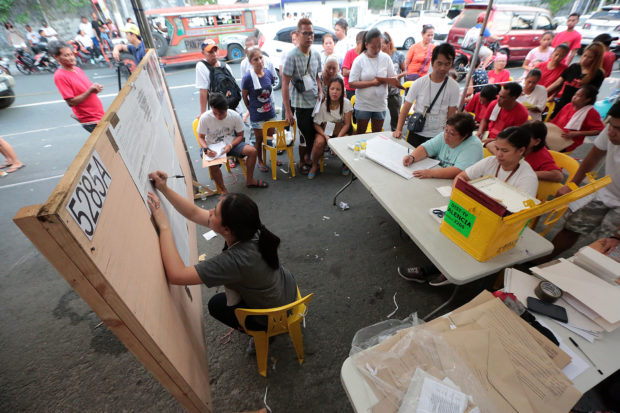House panel okays bill postponing barangay, SK polls

Votes in the May 14, 2018 barangay and SK elections are counted manually at one of the roadside precincts on Boni Serrano Avenue at Barangay Valencia, Quezon City. (File photo by GRIG C. MONTEGRANDE / Philippine Daily Inquirer)
MANILA, Philippines — A House committee has approved a bill postponing the barangay and Sangguniang Kabataan (SK) elections scheduled for December by another year, a move seen to cost the government an extra P5 billion if the measure is enacted into law.
At a hearing on Tuesday, 12 members of the House suffrage and electoral reforms panel chaired by Mountain Province Rep. Maximo Dalog Jr. voted to move the polls to Dec. 4, 2023, in what would be the second deferment since the last village and youth elections in May 2018.
Only ACT Teachers Rep. France Castro and Kabataan Rep. Raoul Danniel Manuel of the progressive Makabayan bloc opposed the motion of Cavite Rep. Elpidio Barzaga Jr.
The lawmaker initially moved to postpone the barangay and youth elections to an unspecified date, noting that 33 separate bills had proposed differing schedules, but the panel ultimately decided on the first Monday of December next year.
In objecting to Barzaga’s motion, the Makabayan lawmakers argued that a deferment would deprive voters of the opportunity to choose a new set of officials for their communities.
Article continues after this advertisementBut Castro and Manuel were outnumbered, 12-2, during the nominal vote.
Article continues after this advertisement5 years in office
Barangay and SK elections are supposed to be held every three years under Republic Act No. 9340. But delays and postponements have often resulted in officials remaining in office for up to five years.
Since 2016, the village and youth polls have been postponed thrice. The elections in December 2022 were actually originally scheduled for May 2020.
Under the lawmakers’ proposal, officials to be elected in next year’s polls will have three-year terms beginning at noon on Jan. 1, 2024.
Incumbents will also be allowed to serve in a holdover capacity until their successors are elected.
The committee version of the bill will still be debated by the entire House in the plenary session.
The panel voted for postponement even as the Commission on Elections (Comelec) said this would mean an additional cost of P5 billion on top of the regular budget.
Comelec Chair George Garcia said the poll body had an P8.4-billion budget for the December polls, adding that it was ready to hold the elections with “proper direction” from Congress.
Political question
But he said the Comelec recognized Congress’ power to postpone elections or extend terms of elected officials as a “political question.”
“If we postpone it to March or December 2023, we will have to continue with the registration of new voters. This will mean additional voters, additional ballots, additional teachers, additional precincts, additional election paraphernalia,” Garcia said.
Some 24 million new voters have registered for the polls, and postponing it would allow the Comelec to reach its target of over 29 million, he added.
Last May, Garcia said the deferment could mean “huge savings” for the government, as the unused budget would end up as savings.
But on Tuesday, he emphasized the cost of pushing back the elections.
“It will entail additional cost. If we factor the increase in honoraria expense for our teachers, it would be an additional P5 billion,” he said during the hearing.
At present, the current budget is enough for the polls, unless teachers’ honoraria are increased, adding P3 billion to the requirement, Garcia said.
Upon learning of the added cost, Barzaga and Quezon City Rep. Franz Pumaren agreed that any potential savings could not be used to justify the postponement.
“Basically we won’t be saving money. We would be incurring an additional P5 billion. We should not say that our intention here is to save,” Pumaren said.
RELATED STORIES
House asked not to reschedule barangay polls for 2024 due to midterm polls
Youth rep: Postponing barangay polls would paralyze SK programs
Comelec: P8-B manual barangay elections still better than postponing polls again